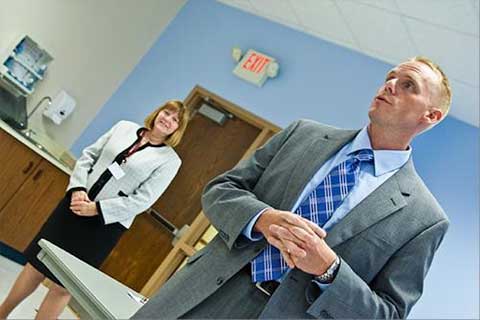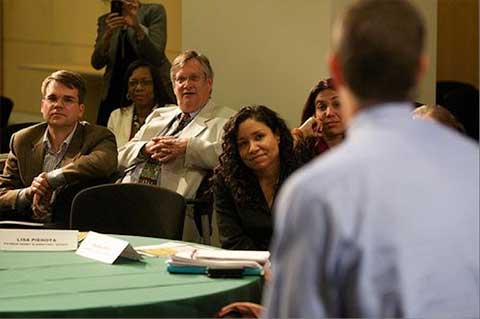Nine Roles For Teacher Leaders
4 Min Read
Teachers are the backbone of the education industry. For educators looking to step up their responsibilities and branch out, there are many paths available to take on leadership roles. These opportunities will help them develop their leadership skills and strengthen their school’s community.
Administrators

One way to become a teacher leader is to look into school administration jobs, which create the opportunity to implement changes, motivate students and faculty and strengthen a school from within. By pursuing an MA in Educational Leadership, which is required for most administration roles, a teacher can become an assistant principal or take on principal training to oversee an entire school. Returning to the classroom and earning a master’s degree will help develop strong leadership skills through mentoring and practical experience. Learn more about the responsibilities of an assistant principal through the eyes of Queens alum Andrea Runyon.
Facilitators
A facilitator is another important role teachers looking to step up to leadership may want to consider. Facilitators serve as team leaders for different grade level teams, working closely with teachers and their students to gather and analyze data about teacher practices and student performance to promote the best student learning outcomes. Queens University of Charlotte alum Kelsey Knipshild, who earned a master’s of school administration in 2012, has applied her leadership skills as a facilitator for Charlotte-Mecklenberg Schools. “I collaborate with teachers about their practice through coaching conversations, pull small groups of students, provide professional develop and lead data conversations,” says Knipshild of her role. “We use data in every aspect of our school and align our practices with best practice research topics. Throughout our professional learning communities, we are constantly evaluating and aligning our teaching to our learning to better student achievement.”
Mentors
Students need mentors, and mentoring them is an essential part of becoming a teacher leader. This includes advising students about colleges and curriculums or helping them with problems ranging from the mundane to the deeply personal. Teacher leaders also mentor their fellow teachers. Read more about the impact of mentorship in developing new school leaders.
Clubs and Organization Chairs
Social and educational clubs are important in schools. They often need leaders and organizers to make them successful. This is a role based on educational leadership that the teacher leader admirably fills, whether it involves chairing the National Honor Society or heading a team for improvement.
Coaches
Similarly, sports are vital in schools. They emphasize the importance of team spirit and collaboration. Many teachers double as coaches for their school’s sports teams. This fosters a sense of camaraderie with the students as well. Being active through sports and engaging with like-minded peers can significantly improve a student’s performance, in addition to providing necessary experience for college transcriptions and applications.
Curriculum Creators
A good school and a successful student body both depend on strong curriculum development. In this instance, a teacher leader helps other teachers come up with new strategies and interesting course material to better engage students. If the current curriculum lacks something essential, such as more math classes or a better history syllabus, the teacher leader spots the gap and seeks to fill it.
Specialty Instructors
Teacher leaders work across the board in varying roles. If students in a chemistry class draft poorly structured reports, then a teacher leader in English will step in and help the chemistry teacher advise the students on how to become better writers. Again, helping both students and teachers is essential and a key role for teacher leaders.
Community Builders
If a teacher leader learns about a new technique or resource, even if it’s not in one’s discipline, the individual will immediately share it. In this way, every teacher constantly improves. The idea of paying it forward creates a much more successful learning environment; it creates a community. The community building course within Queens’ online MA in Educational Leadership curriculum pushes the idea of turning the school environment into a helpful community of educators.
Learners

A true teacher leader never stops learning. He or she attends lectures, seminars and classes to become a better teacher and a better leader. Sometimes that even involves going back to school.
Teacher leaders fill their roles admirably, always considering the betterment of the school and the students. If you’re ready to take leadership to the next level and pursue a career in school administration, consider earning an MA in Educational Leadership online from Queens University of Charlotte, where you will receive mentorship from dedicated faculty members who have served as school leaders themselves and can help guide you on your path to leadership in education.